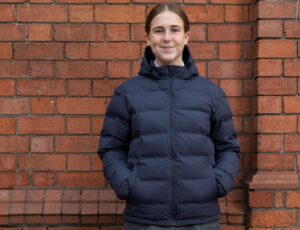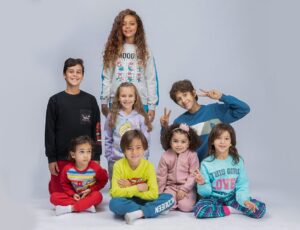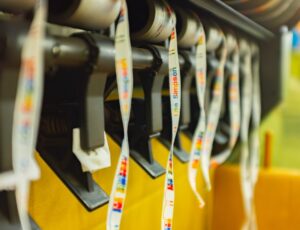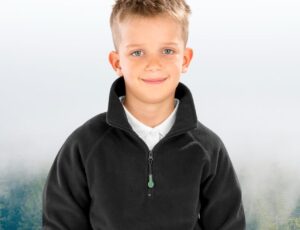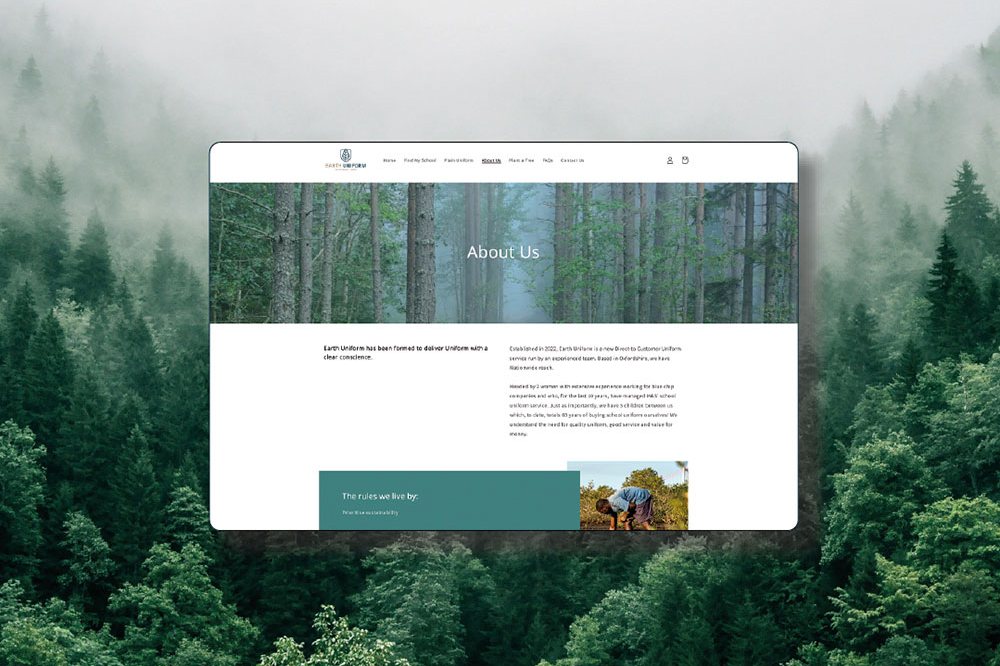
Established in 2022, Oxfordshire-based Earth Uniform is on a mission to supply schoolwear with a clear conscience. Laura Turner speaks to founders Lib Charlesworth and Jo Beeney to learn more about their new, ‘sustainably smart’ schoolwear service.
Laura Turner: What was the inspiration behind Earth Uniform?
Lib Charlesworth: Schoolwear suppliers are making great strides, with more and more availability of uniform that’s sustainable, ethical and traceable, but there are no retailers really taking sustainability as their key position. We could see an opportunity − number one as marketers, but also as parents − to do something that would move the schoolwear industry on. Schools are educating future generations about the world they live in, so those children should not be being educated in uniform that does not reflect the values and needs of all people and the planet. I also feel that childrenswear is such a positive industry, yet schoolwear is still pretty negative; people resent buying it. School uniform is always on the back foot – whenever it’s in the press, usually in September, it’s on the back foot because of the cost. But take uniform away, and then what will it cost you? It wouldn’t be sustainable to remove school uniform, we all need to be owning fewer items of clothing and uniform absolutely fits that bill. My friends abroad are envious that we have school uniform because you don’t have to think about it, there’s no sartorial competition amongst the children, it looks good, and the children are just ready to go. There is so much research in terms of the difference uniform makes to children’s learning, too − making them feel proud, giving them a sense of belonging and providing identity. We need to be shouting about how great uniform is, especially when it’s sustainable and environmentally friendly. It needs to be a much more positive industry and there needs to be more conversation about it. We are very positive about both what we do and our approach, but we feel that the industry as a whole needs rebranding in terms of its perception.
Jo Beeney: We want to try and do something different. I’d like the perception of uniform to be changed; it’s time to break the mould a little bit. As a parent, when my children were younger, there was certainly that dread around Back to School shopping. I really want school uniform to be a positive experience rather than causing angst.
LT: What are Earth Uniform’s key values as a business?
LC: We are planet mindful, honest, determined and positive. We want to create positivity around the whole industry, and we want to think differently. Our tagline is ‘sustainably smart’ – we want to be driven by data and customer feedback.
LT: What are your career backgrounds and how have they influenced your new venture?
LC: Jo was in media − sales and newspapers − and I was in television as a marketing director for companies such as Sky and BT, so quite different backgrounds but as a commonality, both are very customer focused. Jo and I met when we both started working for a local marketing company in Oxfordshire. As part of that, we won the business with Marks & Spencer to promote its bespoke school uniform service, which at that point was completely fledgling and hadn’t been launched. The project required a lot of work and support, so we left our jobs to set up a small company to run the service for Marks & Spencer ourselves, and we did that for 10 years. We set up and managed a microsite, logistics and third-party customer service, and managed the schools and embroidery. We worked very closely with the schools, always going that extra mile, and built up a great name and reputation for ourselves. In February 2022 we parted company with Marks & Spencer and decided to use our knowledge, contacts and ambition to supply school uniform ourselves. We only had from March until May to set up the website, logistics and an
embroidery studio and get a few schools and suppliers onboard, but we had a really successful summer. We have a third director who specialises in websites, data, systems and digital marketing, so he looks after that critical side of the business.
LT: Which schoolwear suppliers are you working with?
LC: Because we launched quite quickly, we have worked with suppliers that we know and gave us confidence that availability-wise, they wouldn’t let us down. One+All in particular has been fantastic and very supportive, as have William Turner and David Luke. Other suppliers are starting to contact us now and we are looking across the board, but we have to stick to the criteria and values that we believe in.
JB: I have two daughters and was very active in handing schoolwear down between them, but I found that by the time my oldest had outgrown something, it was no longer fit for purpose. What we’re starting to see now is suppliers producing better quality garments that can have a second life, so we’ve been really mindful of that when looking for our own suppliers.
LC: Not all school uniform is sustainable, recycled or recyclable at the moment, but where we can’t source an eco garment then we want to make sure that the supply chain and the company are ethical and share our values. Eventually, we’d like to offer a wider range of products beyond uniform, a one-stop shop, whether that’s via holding stock or through partnerships. If we can establish a platform that parents learn to trust, why not offer them more?
LT: How do you engage schools with Earth Uniform’s ethos?
JB: Schools love our story and sustainable position because it’s something that really resonates with the children. For instance, we partner with the environmental conservation organisation Ecologi, a fantastic organisation that plants a tree for each order we take. One of our primary schools is looking at using that as the topic for one of its assemblies, and the business studies teacher from one of our secondary schools has approached us about using our company as a case study for its GCSE business studies students. Communicating with schools and pupils about these topics is really important to us.
LC: We really want to develop our partnership with Ecologi. As a member, you can go onto the website and see how many trees you’ve planted. I would love for that to also be accessible to schools on an individual basis, so they can track the progress based on the orders from their school. The more we can connect with organisations that share our values, the more we can act as conduits. We have direct links to schools and can pass information on. We don’t want to be seen as just a school uniform supplier; we want to be a partner in sustainability that provides uniform. It’s a different way of thinking about it.
LT: Do you support pre-loved school uniform initiatives?
LC: We are not all about selling as many uniforms as possible, we’re about selling the right uniform and also appreciating its second life. For this reason, we work with and promote Grown Out Of It, which was set up 10 years ago by two mums to address school uniform waste and promote the recycling of garments. Their website, which is a bit like eBay for schoolwear, enables people to list uniform under a specific school. Grown Out Of It takes no fees at all, so if there’s a sale, all communication and transactions are solely between the vendor and purchaser.
LT What’s your growth target?
LC: We had six schools for Back to School 2022 and we’ve got 16 now. For Back to School 2023 we’re aiming for 40 to 50 schools and to grow quite considerably thereafter. We may only be a start-up, but we have significant ambition. At the moment we’re making sure we’re delivering and then we’ll start focusing more on our PR.
LT: What are the short and long-term plans for the business?
LC: Short term, our target is to grow the customer base but to grow it backed up by excellent service. We want to get it right. Our absolute short-term aim is not to grow too fast. We are focused on being confident we can deliver what we say we can deliver.
JB: Yes, we have ambitions to grow, but I would rather have 60 schools and they all be really happy and receive great service than have 65 and we’ve let five of them down because I can guarantee, 90% of your attention will be focused on trying to sort those five schools out. I want Earth Uniform to be positive − for people to buy from us and want to come back.
LC: Long, long term, I’d like a place at the table with regard to school uniform, even at government policy level. I would really like to be a voice for sustainability, education, uniform and policy change. Clearly, we want to run a strong, profitable business, but for it to be not just about that; we also want to make a difference to schools, kids and the planet.
For further information and to visit the Earth Uniform website, please click here.







